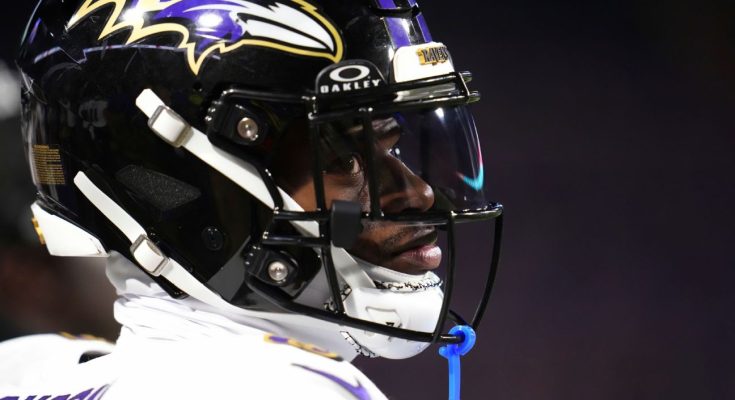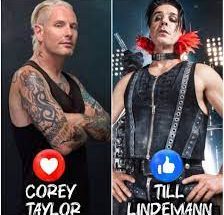Lamar Jackson found himself in a bit of hot water after a Sunday night stadium incident following the Ravens’ loss to the Buffalo Bills. While emotions were running high in a wild, close game that finished 41‑40, Jackson ended up shoving a fan who had slapped his teammate DeAndre Hopkins—and then him—on the helmet during a touchdown celebration. (
After reflecting on what happened, Jackson apologized, offering not only words of regret but also some advice, both for the fan involved and implicitly for himself—and perhaps for athletes in similar moments. (ESPN.com)
The situation unfolded in the third quarter after Jackson connected with Hopkins for a 29‑yard touchdown. As the Ravens celebrated near the front rows in Highmark Stadium, a Bills fan—wearing a red Bills jersey—slapped Hopkins on the helmet, then reached out and slapped Jackson’s helmet too. That set off Jackson’s reaction: he shoved the fan with both hands, causing them to fall back. (NBC New York)
Jackson later said he wasn’t thinking clearly in that moment: “I seen him slap D‑Hop … then he slapped me and he was talking, so I just forgot where I was for a little bit.” (NBC New York) He acknowledged that letting emotion take over was a mistake. Jackson said he should have trusted security to handle the fan, and hoped it wouldn’t happen again. (Sky Sports)
What Jackson said in apology and in advice included a few key lines: “My apologies to him,” he said. “Just chill next time. You can talk trash and stuff, but keep your hands to yourself.” (ESPN.com)
When asked if he’d heard from the NFL about any discipline related to the incident, Jackson said no. Meanwhile, the fan in question was ejected from the game and has been banned indefinitely from Bills and NFL stadiums. (ESPN.com)
The incident comes against the backdrop of high stakes and intense competition. Baltimore had built up a substantial lead, only to see Buffalo reel them in for a dramatic come‑from‑behind win. That may have added to the emotional stakes for Jackson: the frustration of nearly winning, of letting a big lead slip, likely amplified his reaction in that moment. (The Washington Post)
From what Jackson and others have said, there are a few lessons in all this:
One is about self‑control in the heat of the moment. Jackson admits that though the fan’s action was provocative, his own response crossed a line. He suggests security should handle such incidents rather than players reacting physically. (NBC New York)
Another is about respecting boundaries—both for fans and for players. Jackson made the point that talking trash is part of the game; it’s expected at times. But physical contact is not. Slapping someone on the helmet, touching a player, that’s stepping over a line. “Keep your hands to yourself,” he said. (ESPN.com)
Also implicit is the idea of accountability. Jackson didn’t try to dodge responsibility. He said he let his emotions get the best of him. He apologized. He said he’ll try to avoid doing something similar in the future. Learning from these moments matters, even for someone at his level. (NBC New York)
Coach John Harbaugh also weighed in, defending Jackson’s celebration and acknowledging that when a touchdown is scored, players will naturally move toward the stands in jubilation, and that they’re not always expecting to be physically confronted by fans. Harbaugh also pointed out that incidents like objects thrown—he referred to a frozen water bottle thrown near Derrick Henry later in the game—are unacceptable. (NFL.com)
In games like this, where energy, competition, pride, and pressure all collide—especially early in the season—incidents like this aren’t unheard of. But what tends to set them apart is how the people involved respond afterward. Jackson’s apology, his recognition of his own role, the advice he gave, show a willingness to take the moment seriously. (ESPN.com)
At the same time, Jackson noted that despite the incident, he doesn’t plan to avoid celebrating near fans, or being near the crowd. The interaction didn’t change his enjoyment of the moment with his teammates following a success on the field. He said he would probably do it again—meaning getting close to the stands when celebrating—but with the mindset that such provocations should not trigger physical retaliation.
In the end, while the shove drew attention and criticism, it also showed humanity: even elite athletes have emotional responses, especially under pressure. What matters is owning up, apologizing, learning, and setting a standard—both for themselves and for fans. Because part of the game is the interaction between players and fans, but there has to be respect and safety maintained on both sides.
If you like, I can write an analysis of how the league tends to treat incidents like this (from fans vs players, disciplinary patterns, etc.), or compare with other similar incidents.



